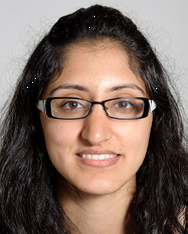Kirandeep Kaur Kandola, Vancouver Fraser Medical Program Class of 2017, discusses her 2014 SSRP project, which examined diabetes in Vancouver’s South Asian community.
Please briefly describe the SSRP project you were involved in.

VFMP student, Kirandeep Kaur Kandola
KK: I had the opportunity to be a member of the Prevention Matters research team under Dr. Tricia Tang this past summer. The overarching goals of this project were to identify facilitators and barriers to lifestyle change for diabetes prevention in Vancouver’s South Asian community and to increase community and research capacity for conducting current and future diabetes prevention initiative in this community. The aim of the projects that I participated in was to gain an accurate assessment of current lifestyle behaviours (particularly physical activity and dietary practices) across the diabetes risk continuum in the South Asian community. I had the opportunity to participate in diabetes risk screening sessions across various temples in the Lower Mainland, and my duties consisted of assisting with risk assessments and completing subject interviews.
In order to gain a more in-depth understanding of physical activity and dietary patterns within the South Asian community, I also conducted one-on-one interviews with randomly selected participants from our screening sessions. This task involved participant recruitment, gaining informed consent, administration of South Asian specific food frequency questionnaire, fitting participants with an accelerometer device to measure physical activity levels, and then a follow-up visit 7 days later to collect the device and discuss rough estimates of exercise levels with participants.
In addition, I had an interest in examining the dietary practices of the this population and the relationship with time since immigration to Canada, so with the help of my supervisor, we utilized a software program to analyze the data collected over the screening sessions.
What, specfically, about the research topic interested you?
KK: I am interested in pursuing a career as a family physician in my home community, where there is substantially large South Asian population that is continuing to grow each month. Individuals of this background are at an increased risk of developing diabetes and related macrovascular complications than their Canadian counterparts. Knowing that diet and physical activity are modifiable risk factors for this condition, I wanted to learn firsthand about the lifestyle patterns within in this community so that I could develop a baseline understanding from where I could begin to perceive which necessary changes could be implemented and how. A family physician has many roles to fulfill in service to their patients, with one important task being working with individuals with the goal of prevention of development and/or further progression of disease. I saw this as an opportunity to begin working with members that may be representative of my future patients and to learn how I could play a role in maintaining their health.
What did you learn both (a) academically and (b) clinically?
KK: My previous experience in research was limited to conducting studies and data entry, which meant I learned very little about the final outcomes of those studies. This project allowed me the opportunity to work from the point of conducting a literature review to generate an idea about what I wished to investigate through to collection and, finally, analysis of data in the context of my hypothesis. I was able to learn about research related to the dietary patterns of South Asian immigrants in other parts of the world, and then compare this to patterns observed in our sampled population. In addition, I was able to learn about how time since immigration can play a role in dietary choices.
Education is a significant aspect of a therapeutic alliance between physicians and patients that cannot be overlooked. This project reinforced the importance of having discussions regarding modifiable lifestyle factors (such as diet and physical activity) with patients, keeping in mind cultural preferences. I feel that this experience will contribute to my future conversations with patients of South Asian origin, particularly those that have immigrated more recently, as I’ve developed a bit of an understanding of which types of food groups they may be more likely to choose, and, thus, can provide them with information regarding healthier options within their preferred food items.
What did you learn to appreciate while participating in this project? Has this influenced your perspective on medicine and patient care?
KK: Participating in this project made me more appreciative of the role that research plays in supporting healthcare providers in their clinical decision. This opportunity allowed me to have lengthy discussions regarding diet with individuals at risk of diabetes and to learn in-depth about patterns specifically within the South Asian community. As a result, I feel more strongly about the need to have detailed discussions regarding changes to diet, especially in relation to culturally-specific items, in pre-diabetic patients and feel that my experiences over the summer will be helpful in this regard.
What do you feel participating in this project will have contributed to your medical education?
KK: Having the opportunity to work directly with participants and to hear about their viewpoint on how they perceive their lifestyle decisions provided an important lesson on the importance of understanding culturally specific lifestyle decisions. I hope to play a key role in maintaining good health and preventing disease & complications in a similar patient population in a few years, so I appreciated the opportunity to be exposed to this scenario at an early point in my training. In addition, I was previously quite inexperienced with conducting data analysis and this project allowed me to better understand the process required to generate evidence that is utilized to create recommendations and guidelines for healthcare workers.